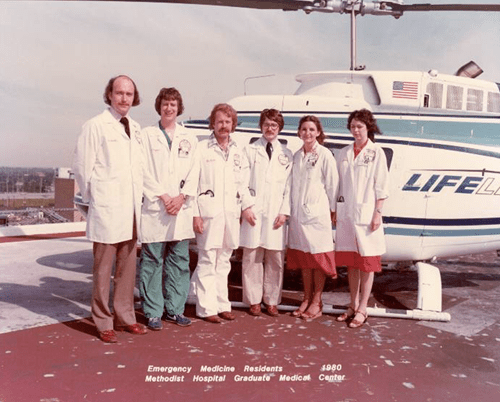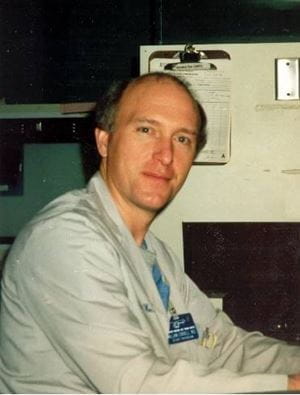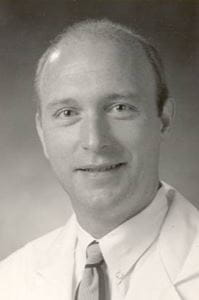William Cordell Jr., MD, a Department of Emergency Medicine faculty member for more than 25 years, passed away on March 2, 2025. Dr. Cordell, known as Bill to friends and colleagues, was a dedicated, innovative and inspiring physician to many in the emergency department. He shaped the careers of countless medical professionals and he had a unique gift for making learning both meaningful and enjoyable. Dr. Cordell's legacy lives on through the many lives he touched, and his influence will continue to shape emergency medicine for years to come. Brent Furbee, MD, Professor Emeritus of Clinical Emergency Medicine, shared the following tribute.
A short time ago, many of us had awakened to the news that we had lost a dear friend and one of the best medical educators that we have known. He had been ill for a number of years but continued to work and teach during a good portion of that time.
As the sad message traveled, friends began to acknowledge what Bill had meant to them.
- "Bill was a brilliant man and the reason I became a doctor."
- "Bill was very influential to me as a resident and always made things fun and interesting."
- "He helped me (same with all of my colleagues) on my research project. He made the dreaded research project fun. I have great, fun memories of Bill."
- "Bill Cordell was a multi-talented guy."
- "Bill was a huge influence on me as a medical student and resident. He could teach you so much in such a short or sometimes not so short (big smile) conversation or patient presentation."
- "I recall that Bill was also a futurist, prognosticating on what’s in store for health care, as well as everything."
- "The most creative mind I have ever known."
- "Great mentor to a great many EM doctors who in turn used their expertise to touch a great many patients."
- "He was a special person – brilliant, inspiring, hilariously funny and very kind."

It has been my privilege to have known Bill for 47 years. He and I were in the third class of emergency medicine residents at Methodist Hospital in 1980. Even the continued existence of the residency was due in part to his efforts during that time.
Bill’s dedication to teaching was evident even during his residency; he was very active in the training of rotating residents and students as well as nurses in the emergency department. As faculty and staff, he continued to look for new and innovative ways to educate health care providers. Serving on the Indiana Chapter of the American College of Emergency Physicians Board of Directors for six years, he was the leading force in the development and presentation of the yearly symposium in addition to other educational endeavors. As informational resources grew in the '90s, Bill saw that as a major focus of emergency medicine and a natural fit for him. He became the director of informatics in our growing residency where some 50 emergency medicine residents each year learned the importance and complexities of medical informatics.
Evidence-based medicine came to our program in large part because of Bill Cordell. He reworked journal club to focus on the principles of evidence-based medicine. He organized the evidence-based medicine programs for first-year medical students at Indiana University School of Medicine. He took a discipline that could be laborious and dry and shaped it into an essential and at times, even enjoyable, pursuit.
Bill’s tremendous contribution to emergency medicine education hasn’t been based solely on the content of his teaching. He has studied how people learn. He focused on how to make education enjoyable. For Bill, that was relatively easy given his infectious sense of humor. As I think of it, I can’t recall a meeting, conference or social gathering where Bill was present and we weren’t laughing.

Bill and I have been close friends since we were residents together and when I say that he has been a driving force in emergency medical education some would say I’m biased. They would be right. But I’m not a lone voice in that regard. You may have had the opportunity to know and see him in action. But if that was before your time, ask any one of over three hundred other emergency medicine physicians who have gone through our residency and are better practitioners due to his efforts. Ask the hundreds of people who have listened to Bill at national and international meetings. Ask the people who have worked with Bill and have seen his ongoing dedication to teaching students, residents, nurses and fellow faculty. You’ll find that they agree that he has made an immeasurable contribution to their education and, like me, they will tell you he will be truly missed.
